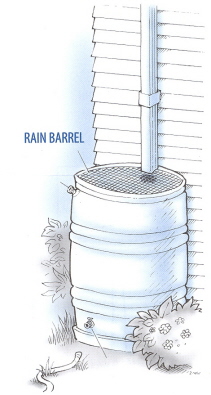 6. I am looking for ways to conserve water and reduce my bill.
6. I am looking for ways to conserve water and reduce my bill. As a baseline number, a typical residence uses 10 units of water (or 7480 gallons) per person every three months for each quarterly billing cycle, or about 83 gallons of water, per person per day, including the water used for irrigating outdoor landscaping in the summer. Residential water consumption is typically higher during warmer months and lower in the colder months, when we are not watering lawns or using air conditioners.
Simple conservation behaviors can save dozens of gallons of water every day: Turn off the tap while brushing teeth; take shorter showers; run dishwashers and laundry machines only when full; water your lawn only when necessary.
Outdoor irrigation—watering lawns and gardens—can easily double your water usage during the warm-weather months. Reducing outdoor irrigation doesn’t need to mean a dead landscape! First, control your lawn watering by adjusting the frequency that your automatic sprinkler system turns on. You can also turn off the automatic timer on your sprinkler and manually run your sprinklers as needed. The MSU extension service has identified that applying an inch of water every week-to-ten days is adequate for maintaining a green lawn under normal summer weather. Use a water gauge or empty tuna fish can to measure the natural rain water each week and then also measure the amount of water distributed by your sprinkler. Turn off the hoses when the gauge reaches an inch. Other water conservation choices include reducing lawn areas, planting native species, and applying mulch around plantings. During a heat wave, it is possible to stop watering a lawn completely and allow the grass to go dormant. Dormant grass will rebound to green lushness when the cooler weather and rains return in the fall. If uncomfortable with this approach for your entire lawn area, you can test a section of your lawn in a less-visible area.
Indoors—consider replacing your older toilet with a low-flow model. Low-flow shower heads and faucet aerators quickly reimburse you for their cost through water savings. Check EPA’s online water utility auditing pages, including suggestions for WaterWise and EnergyStar appliance options to save water, energy, and money: http://www.epa.gov/watersense/.
Save money on your stormwater bill rate by using rain barrels, installing a rain garden, taking an online RiverSafe Home tutorial, etc. See water-saving stormwater credit details at www.a2gov.org/storm.
More water conservation tips are provided in the Do-it-Yourself Home Water Audit Kit for $2 each, while supplies last, available from the Customer Service and Payment Center on the first floor of City Hall, 301 E. Huron, during weekday business hours.
Have you noticed a big increase in your water bill recently? Suggestions to explain water usage spikes, ways to test for leaks, and suggestions for making minor plumbing leak repairs are provided in Question 1.
Return to the Consumer's Guide to Tap Water main page
